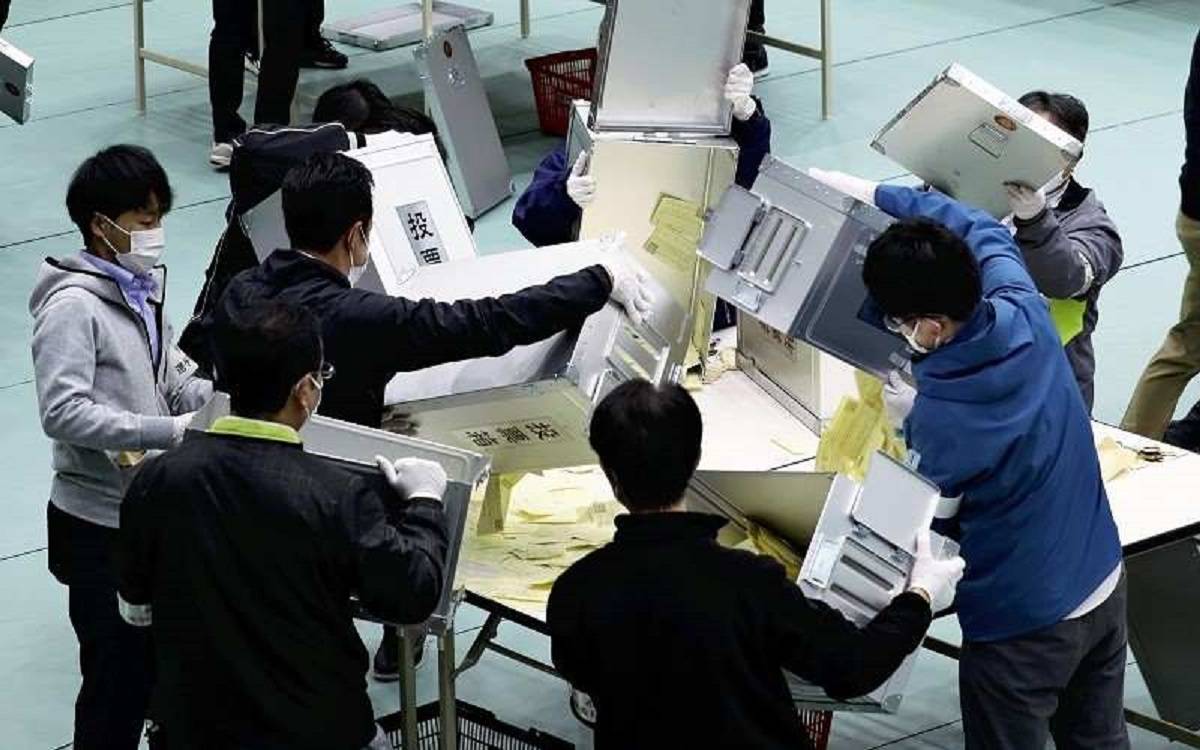
TVote counting in Mito, Ibaraki prefecture.
12:25 JST, March 6, 2023
Tokyo (Jiji Press)—Efforts are underway across Japan to increase candidates for regional legislative assemblies, amid shortages due to declining populations and the aging of society.
In 375 town and village assembly elections held as part of unified local polls in 2019, 93 saw no competitive races, with the share of uncontested seats hitting a record high of 23.3 pct.
Amid fears that the existence of assemblies may be at risk, many areas are taking steps to secure new candidates, including promoting human resource development and raising members’ pay.
Sense of Crisis over Candidate Shortages
In the 2019 elections, Hokkaido, northern Japan, logged four municipalities with fewer candidates than there were seats, the highest among the country’s 47 prefectures.
Spurred by a sense of crisis, a group of assembly members in Hokkaido launched a training course last April with the aim of increasing the number of candidates.
Fifty people in their 20s to 70s attended six lessons in the course through this January, learning from incumbent assembly members and university professors how to draft ordinances and prepare for races.
Seven of the students on the course plan to run for office in upcoming unified elections in April.
“I had an interest in city politics from before, but I didn’t have local supporters, name recognition or funds,” said a man in his 40s who plans a bid for a city assembly seat in Hokkaido. “The fact that I was able to connect with people whom I can consult is my greatest asset.”
“New members won’t emerge if we don’t act,” said Hiroshi Tsuji, a member of the city assembly of Hokkaido’s Noboribetsu who is one of the hosts of the course. “We need to support and nurture them.”
Pay Level Making Child-Rearing Possible
The average monthly pay of town and village assembly members is around ¥210,000, lower than the average starting salary for corporate employees who are college graduates.
Some assemblies aim to increase their pay levels, claiming that the low compensation is one of the reasons for the continuing lack of candidates.
After its number of candidates fell below the seat total in an election in 2017, the village of Ikusaka in the central prefecture of Nagano increased the monthly pay for assembly members aged 55 or under from ¥180,000 to ¥300,000.
The raise took into consideration the cost of raising children, while the upper limit of 55 years old reflected the age at which child-rearing often ends.
“Assembly members are people too, and if they have children, they have the obligation to raise them,” Ikusaka assembly chairman Yuzuru Ota said.
In a survey conducted by the Ikusaka village assembly before the pay raise among randomly selected residents aged 25 to 50, more than 70 pct of respondents supported the hike.
An Ikusaka assembly election in 2021, the first since the pay increase, saw the first competitive race in 20 years and led to two new assembly members aged no older than 55.
“I think it has become easier than before to try to become an assembly member,” Ota said.
Residents’ Understanding is Key
Gaining the understanding of local residents for increasing pay is no easy task. The town assembly of Chizu in the western prefecture of Tottori approved an increase of ¥51,000 for members’ monthly pay in September 2020, but some residents opposed the move citing a lack of explanations.
Over 1,000 people signed a petition calling for the raise to be repealed, and the town was forced to postpone it.
While the town is holding information sessions in each community to seek residents’ understanding, it is unclear when the pay increase can be implemented.
“In order to raise compensation, assemblies must be trusted by residents,” said Reiko Oyama, professor at Komazawa University in Tokyo who is an expert on assembly systems.
Oyama called on assemblies to actively spread information to increase the interest of citizens, saying “they need to say that they will turn into assemblies in which it is easier for women and young people to participate.”
Top Articles in Politics
-

Japan PM Takaichi’s Cabinet Resigns en Masse
-

Sanae Takaichi Elected Prime Minister of Japan; Keeps All Cabinet Appointees from Previous Term
-

Japan’s Govt to Submit Road Map for Growth Strategy in March, PM Takaichi to Announce in Upcoming Policy Speech
-

LDP Wins Historic Landslide Victory
-

LDP Wins Landslide Victory, Secures Single-party Majority; Ruling Coalition with JIP Poised to Secure Over 300 seats (UPDATE 1)
JN ACCESS RANKING
-

Producer Behind Pop Group XG Arrested for Cocaine Possession
-

Japan PM Takaichi’s Cabinet Resigns en Masse
-

Japan Institute to Use Domestic Commercial Optical Lattice Clock to Set Japan Standard Time
-

Man Infected with Measles Reportedly Dined at Restaurant in Tokyo Station
-

Israeli Ambassador to Japan Speaks about Japan’s Role in the Reconstruction of Gaza





















